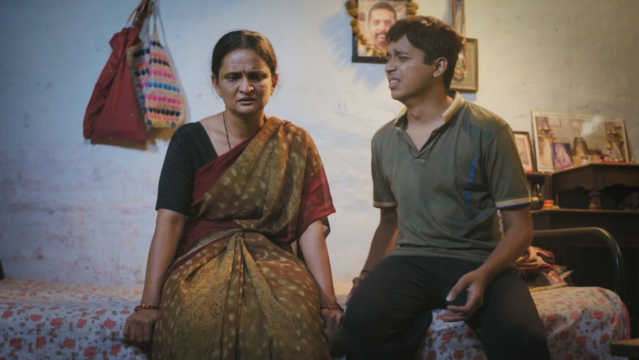
Shriram Iyengar
Mumbai, 01 Apr 2019 16:00 IST
Directed by Jaykar, the film's chawl setting becomes a symbolic representation of an India that is messy, chaotic, but together in its problems.

For anyone who remembers the decade of the 1980-1990s, television serials like Nukkad, Yeh Jo Hai Zindagi were an inevitable memory. In Madhuri Dixit's debut production, 15 August, Swapnaneel Jaykar repackages the life in a vibrant Mumbai chawl as a microcosm of the nation itself. The film captures the many personalities, divides, issues, and joy that emerges from the chaos of life within this society.
The story is set in Gandhi chawl that is set to celebrate one of the big festivals of the year — Independence Day. The event has its own joy for different people. While kids enjoy the mandatory holiday, there is the group of annoying uncles trying to prove their patriotism, and the young lovers trying to solve their own problem. The film captures these multiple personalities, their little stories and anecdotes with an endearing simplicity.
The story primarily revolves around Raju (Rahul Pethe) and Jui (Mrunmayee Deshpande) who are in love. Raju, a struggling artist, ekes out a living hoping to exhibit his work at a city gallery. But optimism is not something Jui can keep using to avoid the arranged marriage offer on her hands. They are not the only ones trying to dig their way out of a hole.
When little Ninad gets caught trying to pick up Raju's Rs5 coin from the flag hole, the chawl gets together to find some eccentric solutions. From the drunkard to the chawl head to the politician, everyone promises and talks big while ending up nowhere near the hole.
Jaykar and writer Yogesh Vinayak Joshi capture the eccentricities that fuel India. The chawl becomes a representation of India with its many layers, complexities and clashes. These are explored with understated drama and nuanced emotion making this story worth following. At times, the focus on the concept makes it feel repetitive, but it does not take away from the joy of the scenes. The film also eschews any attempt to make a big finish. In fact, the anti-climactic turn on the big Independence Day speech makes it real and immediately arresting.
The acting is impressive. Rahul Pethe, Mrunmayee Deshpande and even Adinath Kothare play their parts with nuance. The jack in the box is Vaibhav Mangle, playing the annoying, but energetic leader who has a say in everything. The magic though lies in the cast which also includes Vijay Maurya, Satish Pulekar, among others. It is every character and its personality that enriches the story.
These little nuances are captured with an elegant camerawork. The scenes are set up with a lazy elegance that makes the scenes go down easy. Perhaps it is appropriate that the film is watched on an OTT platform as it brings a certain familiarity and closeness to the audience. That is what makes this film worth the time.
In all, Jaykar tells a story that is both familiar and has been told before, but he recreates it for a different age and a new audience that is slowly losing touch with the diverse, multi-hued personality that once filled the city of Mumbai, and the country of India.
You might also like

Review Marathi
Samaira review: This well-intentioned travel drama suffers from a dull script
Actor Rishi Deshpande's directorial debut doesn't rise as much as its performances. ...

Review Marathi
Goshta Arjunchi review: Triggering conversations about mental health
Anupam Barve’s short film urges people to talk to their families about what they are going...

Review Marathi
Ekda Kaay Zala review: Sumeet Raghvan impresses in a film that does not use its full potential
Directed by Dr Saleel Kulkarni, the film has a fine act by child artiste Arjun Purnapatre....

